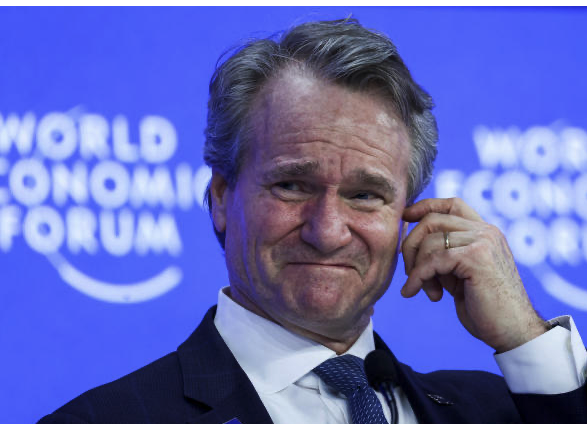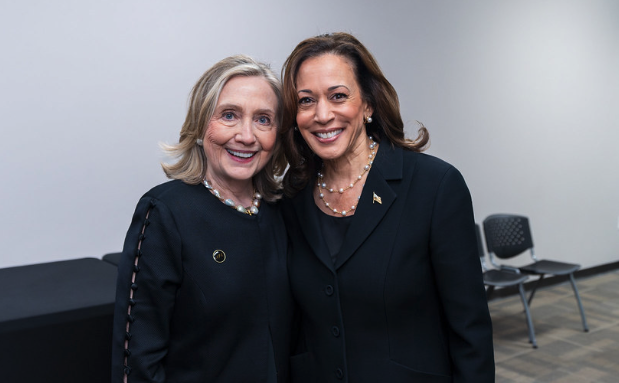It was classic Donald Trump at the World Economic Forum on Thursday—direct, unapologetic, and willing to say what most politicians wouldn’t dare. This time, his target was none other than Bank of America CEO Brian Moynihan, who found himself on the receiving end of a pointed critique about the alleged discrimination against conservatives in the banking world. And let’s be honest, it’s not every day that you see a sitting president call out one of the most powerful bankers in the world on stage, but Trump has always been anything but conventional.
“You’ve done a fantastic job,” Trump began a compliment that must have momentarily disarmed Moynihan before the gloves came off. “But I hope you start opening your bank to conservatives because many conservatives complain that the banks are not allowing them to do business within the bank—and that included a place called Bank of America… They don’t take conservative business.” Ouch. If Moynihan thought he was going to skate through the Q&A unscathed, he was sorely mistaken.
Trump didn’t stop there. He questioned whether this alleged bias was a result of pressure from the Biden administration regulators. While Moynihan awkwardly pivoted to a safer topic—Bank of America’s sponsorship of the upcoming World Cup—the exchange left a glaring question unanswered: Are some of America’s largest financial institutions really sidelining conservative customers?
🚨 President Trump just took a wrecking ball to @BankofAmerica CEO Brian Moynihan at the World Economic Forum in Davos, telling him *to his face* to stop debanking conservatives: pic.twitter.com/CG87LLUCLw
— Will Hild (@WillHild) January 23, 2025
For their part, Bank of America and JPMorgan have flatly denied the accusations. “We welcome conservatives,” a Bank of America spokesperson told FOX Business, pointing out that they serve more than 70 million clients. JPMorgan followed up with a similar statement, declaring, “We never close an account for political reasons, full stop.” But denials aside, this isn’t the first time Bank of America has been accused of discriminating against conservatives—or those who simply don’t fit the progressive mold.
Case in point: Timothy Two Project International, a nonprofit that trains pastors in underserved areas, received a letter from Bank of America in 2020 notifying them that their account would be restricted in 21 days and closed completely in 30 days. The organization wasn’t given a clear reason other than being “engaged in a type of business that [the bank] had chosen not to service.” For an organization that requires international travel and relies on consistent banking, this was more than inconvenient—it was disruptive.
Steve Curtis, founder of the nonprofit, shared the experience with FOX & Friends First at the time, emphasizing the lack of transparency from the bank. “We still don’t know anything as to the why,” Curtis said, a sentiment that echoes what many other conservative-leaning individuals and organizations have reported in recent years.
And let’s not forget another significant controversy: allegations that Bank of America and other major financial institutions have used their influence to target the firearms industry. According to a report by the American Accountability Foundation, titled “Debanked by the Banks,” several Wall Street giants, including Bank of America, have allegedly denied services or made life difficult for firearms manufacturers, retailers, and organizations representing lawful gun owners. These allegations have fueled broader concerns about whether big banks are weaponizing their financial clout to enforce ideological conformity.
Even Republican lawmakers have weighed in. Rep. Jim Jordan (R-Ohio) criticized what he called “de-banking” and accused federal officials of encouraging financial discrimination. Jordan’s remarks have amplified conservative fears that banks, under pressure from regulators or their own left-leaning leadership, are making decisions based on politics rather than sound business practices.
While Bank of America continues to deny any wrongdoing, the growing list of accusations paints a troubling picture. Trump’s remarks at the World Economic Forum weren’t just off-the-cuff—they tapped into a broader frustration among conservatives who feel increasingly alienated by institutions that once prided themselves on neutrality. Whether Moynihan and other banking executives take Trump’s advice to heart remains to be seen, but one thing is certain: this debate isn’t going away anytime soon.




